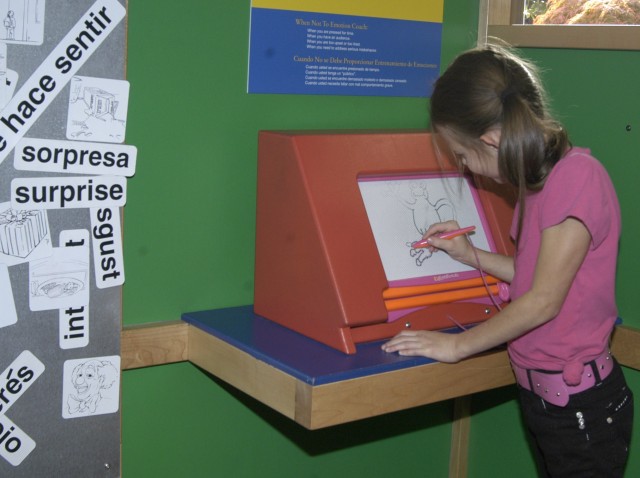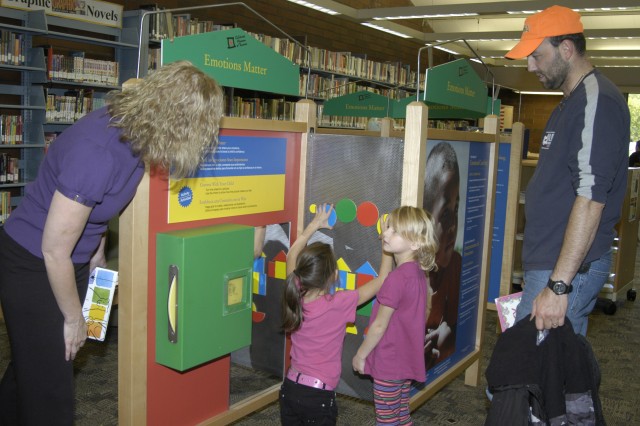FORT LEWIS, Wash. - Emotions Matter, an exhibit designed to provide support to military Families by sharing strategies for dealing with emotions in a playful way, could be traveling to Army garrisons soon.
"My five-year-old son has been in counseling for the past two years and the Emotions Matter exhibit at the Ft. Lewis Grandstaff Library was an amazing outlet for his feelings and emotions," Juli Demery enthusiastically said.
"The exhibit had all the means of expression that he had been working on in his therapy. It was great to have an outlet for him to express his feelings and know that it's okay to feel the way he feels and to work through his feelings in a safe environment other than in his counselor's office.
"The library even had the same books his counselor has. Everything supported what his counselor has been doing, so the extra venue really helped my son make leaps and bounds in his therapy," Demery said.
Created by the Children's Museum of Tacoma, the exhibit is based on Dr. John Gottman's "5 Steps of Emotion Coaching." Gottman is Professor Emeritus at the University of Washington's Department of Psychology.
"John lives and works in Seattle where I've heard him speak about emotion coaching several times. He also was working closely with Talaris at the time we were partnering with them. His research is very powerful," Debbie Kray, education director at the museum, said.
Talaris, established in 2000 by Seattle philanthropists Bruce and Jolene McCaw, seeks to advance knowledge of early learning and the importance of parenting in the first years of life.
The Emotions Matter exhibit provides opportunities for parents and children to learn independently or together through five activity stations based on Gottman's five steps.
Emotional Awareness pairs a face to an emotion and helps emotion recognition in adults and children. Connecting matches facial expressions to items and shows how a child connects emotions to events. Listening uses a sound board where adults learn to listen with empathy and honor children's emotions. Naming Emotions is a matching game that helps children identify and name emotions. Finding Good Solutions is a playhouse with open-ended activities to allow adults to support children as they explore appropriate emotional responses.
"Each of the five stations is used to help parents and children identify emotions through play and through a variety of hands-on operations. Children can make faces in a mirror, listen to the sounds of emotions, write about emotions using poetry, read about emotions with the provided books, and with the Magna Doodle draw about emotions. It's an interactive exhibit to be shared by Families, caregivers, teachers and children," Georgia Cartner, youth services specialist at the Ft. Lewis library system, said.
According to Kray, parents do not need, nor should they try, to emotion coach all the time. But if they can just stop and listen to their child, help them build the skills to share how they are feeling, and think through what they can do about it, it makes a difference.
Gottman's research has shown that just by using emotion coaching techniques thirty percent of the time, children can be taught strategies to self-regulate their emotions.
"In early education, that's huge. With self-regulation, children gain the ability to attend to other tasks and be school ready," Kray said.
The popular exhibit travelled throughout Pierce County (Washington) Library branches before moving to Ft. Lewis's library system, thanks to a generous grant by the U.S. Army's Child, Youth and School Services, through Sandy Johnson.
"We developed a partnership with the Children's Museum of Tacoma where we learned the Peirce County Library System had this great exhibit but the cost would be $8,500 for three months, including shipping, setting up and dismantling.
"We had to say 'no thanks,' but then Sandy Johnson who worked in Outreach at CYSS here on base said, "Hey, we heard about this great exhibit. We'll pay for it, because it will give children of deploying parents a chance to open up a dialogue about their emotions," Cartner said.
Sandy Johnson, CLEOS (Child, Youth & School Services Liaison, Education and Outreach Services) Administrator at Ft. Lewis, knew how tough it had been for the children of parents who had been through many deployments.
"I just thought that if the library had the space and felt as strongly as we did about this that we should have Emotion Matters here on Ft. Lewis for all our parents and Families," Johnson said.
Sandy learned about the exhibit through an off-post early learning group called First 5 FUNdamentals of Pierce County - a group started by the United Way of Pierce County.
"This group consists of a variety of agencies throughout Pierce County who are very dedicated to children, aged zero to five. First 5 ensures they are ready for school, physically, socially and emotionally. I met with several librarians who told me about the significance of the exhibit and the positive response they had been receiving from parents," Johnson said.
Emotions are a natural part of daily life but for children emotions can also be a time of frustration, giving them a sense they don't have control.
"On the parent side, it gives us one more strategy to deal with difficult situations. None of us are 100% ready to parent when our child comes along, and at emotional times we can often fall into what we experienced in our childhood, which may or may not be the best example of how to positively help children," Kray said.
"At the children's museum as parents transitioned between playing and leaving, the staff often witnessed the stress and emotion that arose. Teaching our staff about emotion coaching was great to help them model ways to positively help children in emotional moments."
The kits produced by the museum for the exhibit have also been used by children in other venues.
"We have found the strategies and activity kits we produced for this exhibit to have endless opportunities. We have worked with our local children's hospital and the activities we created for them were often used by their life specialists in one-on-one time with patients to help them gauge children's emotional state and pain levels in a playful way.
"We have worked with our local hospice care and the kits have been used to help children who are losing loved ones talk about how they feel. We have worked with a group of women recovering from drug addiction and in sessions with them and their children we used the exhibit as a way to playfully engage and think about how they can be more connected with their child.
"Play is a wonderful thing. It is the work of children. And what better way to help children build the skills to help them deal with some of life's most challenging moments," Kray said.
According to Dr. John Gottman, professor of psychology at the University of Washington, emotional awareness and sensitivity - more than IQ, help determine success and happiness in all facets of life, including marriage and career.
"In my research, I discovered that love by itself wasn't enough. We found that concerned, warm and involved parents often had attitudes toward their emotions and their children's emotions that got in the way of talking to their children when the child was sad or afraid or angry. The secret to being an emotionally intelligent parent lay in how parents interacted with their children when emotions ran hot," Gottman said.
"I understand the exhibit might be traveling to other bases. Our Family is moving to Ft. Rucker and I would like to put in my vote to move it there. We are huge fans and will definitely use the exhibit a lot," Demery said.
Since it is only one exhibit, Debbie Kray, who was in charge of developing the Emotions Matter exhibit, would also be open to talking about developing versions that could be in multiple locations.
For more information and a PDF on the loan information, visit http://www.childrensmuseumoftacoma.org/traveling-exhibits.
Emotions Matter was created by a grant from the Child Care Bureau, U.S. Department of Health and Human Services and support from The Paul G. Allen Family Foundation, The Boeing Company and Talaris Research Institute.




Social Sharing